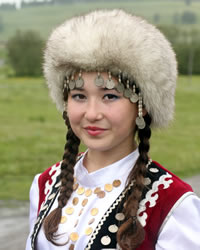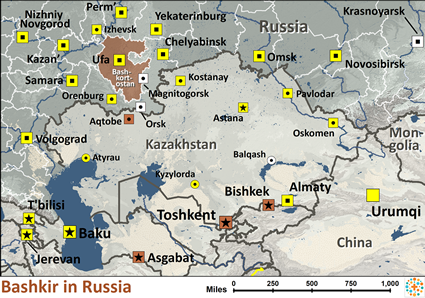There were several explorers and traders who had contact with the Bashkir, but in 922 an Arab ambassador wrote the first profile of this nomadic people group. Some were beekeepers, but most were pastoralists who raised horses, cattle and sheep. They were noted for being tough and warlike.
The Bashkirs have been dominated by more powerful peoples for centuries. By 1236, Ghenghis Khan and the Mongols incorporated their land. In the past, Bashkir villages were divided into "patrilineal" (male-dominated) tribes. The Bashkirs ran their affairs, regulated disputes, and sought help within these tribal clan structures. This strong tribal structure allowed them to successfully hold off Russian occupation in the seventeenth and eighteenth centuries. However, near the end of the eighteenth century, they were defeated.
In the late eighteenth and early nineteenth centuries, there was a great influx of Tatars, Russians, and other groups into the Bashkir homeland. The newcomers began "buying" or seizing the pastoral land, severely damaging the economy of the Bashkirs. Suddenly, the Bashkirs, who had lived for generations as shepherds, were forced to give up their nomadic way of life and become farmers.
Much of the Bashkir tribe's social significance has been lost. Today, the village itself is regarded as the key to their social structure. Some of the Bashkir groups in Russia have lost all memory of their tribal clan origin. Nevertheless, they still express their sense of kinship and loyalty to kinsmen.
About half of the Bashkirs in Russia live in cities, the other half live in rural areas. Those in farming areas farm and raise livestock for their livelihood. They raise horses and sheep along with some cattle and goats. The sheep are raised for their wool, skins, and meat. They enjoy a fermented drink, called koumiss, that is made from horses' milk. They cultivate wheat, oats, sunflower, corn, cucumbers, tomatoes, and potatoes with modern equipment.
Bashkir marriage ceremonies usually take place in their homes. However, a mullah (Muslim leader) usually participates in the marriage agreement. Young newlyweds live with the husband's parents until they are ready to form their own family. Polygyny (the practice of having more than one wife at a time) is a thing of the past, having been prohibited by the Family Code of the Russian.
Quite a number of the Bashkir live in colonies that are located outside their territory in southwestern Russia. There, they are dominated by Russian schools, newspapers and cultural practices while their culture erodes. Bashkir rural dwellers have managed to preserve their national identity, but those living in the urban colonies have been absorbed into the Russian way of life.
Although using "folk remedies" is still common, Soviet-style medicines and clinics are used to cure more serious illnesses. Health services are free of charge, which has led to improved health among the Bashkirs. Today, people are living longer, and fewer babies are dying than in previous times.
Each summer the Bashkirs and Tatars in Russia celebrate the Sabantuy Festival in Moscow. Pole climbing, horseracing, wrestling, and sack racing are all part of the fun. This celebration dates back to rural Bashkir communities during the Middle Ages.
Bashkir cuisine is heavy on dairy products. Their traditional dish is bishbarmaq, with includes boiled meat and a type of noodle covered with herbs, onions, and cheese.
The Bashkirs love their folklore, which is usually about their early history. It includes aspects of worldly wisdom, morals and social aspirations. These are in the form of mythology, fairy tales and legends. They are especially fond of poetry.
Although the Bashkirs are not as zealous as other Muslims, any form of Islam is difficult to influence.
The Bashkirs began to convert to Sunni Islam in the 1100s, and there was wholesale conversion in the 1300s. In the eighteenth century, the Orthodox Church attempted to convert them to Christianity, but today, very few are Christians. Those who converted to Christianity are now organized into a tiny, separate minority known as the Nagaibaks. Although the Bashkirs are not as zealous as other Muslims, any form of Islam is difficult to influence. This stronghold can only be broken down through prayerful intercession.
The Bashkirs know very little about their own history. They are a people who lack security in who they are. They need to know that this security can only be found through Jesus Christ!
Pray for an abundant harvest this year for Bashkir farmers as a testimony of God's kindness and power.
Pray for Bashkir elders to open their communities to the transforming work of Jesus Christ.
Pray for a spiritual hunger that will lead Bashkir Muslims to the cross and the empty grave.
Pray for workers, filled with the fruit and the power of the Holy Spirit, to be thrust out into Bashkir communities.
Pray for an unstoppable movement to Christ among the Bashkirs in Russia.
Scripture Prayers for the Bashkir in Russia.
| Profile Source: Joshua Project |

























